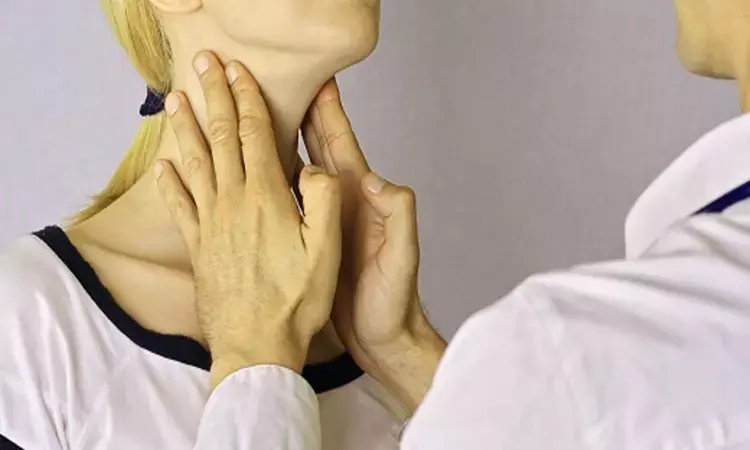- Home
- Medical news & Guidelines
- Anesthesiology
- Cardiology and CTVS
- Critical Care
- Dentistry
- Dermatology
- Diabetes and Endocrinology
- ENT
- Gastroenterology
- Medicine
- Nephrology
- Neurology
- Obstretics-Gynaecology
- Oncology
- Ophthalmology
- Orthopaedics
- Pediatrics-Neonatology
- Psychiatry
- Pulmonology
- Radiology
- Surgery
- Urology
- Laboratory Medicine
- Diet
- Nursing
- Paramedical
- Physiotherapy
- Health news
- Fact Check
- Bone Health Fact Check
- Brain Health Fact Check
- Cancer Related Fact Check
- Child Care Fact Check
- Dental and oral health fact check
- Diabetes and metabolic health fact check
- Diet and Nutrition Fact Check
- Eye and ENT Care Fact Check
- Fitness fact check
- Gut health fact check
- Heart health fact check
- Kidney health fact check
- Medical education fact check
- Men's health fact check
- Respiratory fact check
- Skin and hair care fact check
- Vaccine and Immunization fact check
- Women's health fact check
- AYUSH
- State News
- Andaman and Nicobar Islands
- Andhra Pradesh
- Arunachal Pradesh
- Assam
- Bihar
- Chandigarh
- Chattisgarh
- Dadra and Nagar Haveli
- Daman and Diu
- Delhi
- Goa
- Gujarat
- Haryana
- Himachal Pradesh
- Jammu & Kashmir
- Jharkhand
- Karnataka
- Kerala
- Ladakh
- Lakshadweep
- Madhya Pradesh
- Maharashtra
- Manipur
- Meghalaya
- Mizoram
- Nagaland
- Odisha
- Puducherry
- Punjab
- Rajasthan
- Sikkim
- Tamil Nadu
- Telangana
- Tripura
- Uttar Pradesh
- Uttrakhand
- West Bengal
- Medical Education
- Industry
Undertreated hypothyroidism linked to worse hospital outcomes

Undertreatment with thyroid hormone replacement can put patients with hypothyroidism at risk for worse hospital outcomes, including longer length of stay and higher rates of readmission, according to a new study published in the Endocrine Society's Journal of Clinical Endocrinology and Metabolism.
Hypothyroidism, or an underactive thyroid, is a condition in which the thyroid gland does not produce enough thyroid hormone. It is a common disease in the United States, with millions of patients taking thyroid hormone replacement. Treatment can be challenging, and patients can be overtreated or undertreated, according to lead study author Matthew D. Ettleson, M.D., of the University of Chicago in Chicago, Ill.
"We found that those patients who were undertreated with thyroid hormone, even weeks or months prior to hospital admission, had worse hospital outcomes than those without hypothyroidism," said Ettleson. "This has not been shown previously."
The study included 43,478 patients from a large, U.S.-based patient claims database. Of these patients, 8,873 had hypothyroidism. The researchers divided patients into four groups based on their levels of thyroid stimulating hormone (TSH). Low levels of TSH indicate a patient has been overtreated for their thyroid disease, while high levels of TSH correspond to undertreatment.
Patients with a high TSH level before hospitalization had a length of stay that was 1.2 days longer, a 49% higher risk of 30-day readmission, and a 43% higher rate of 90-day readmission compared with patients without hypothyroidism.
Those with a normal TSH level before hospitalization had a decreased risk of dying in the hospital and decreased 90-day readmission rate compared to patients without hypothyroidism.
"The results suggest that suboptimal treatment of hypothyroidism is associated with worse hospital outcomes," Ettleson said. "It is important for both patients and physicians to know that maintaining optimal thyroid hormone replacement is important to minimize length of hospital stays and hospital readmission. It is particularly important for planned admissions where thyroid hormone replacement can be adjusted if needed prior to admission." Other authors of this study are Antonio C. Bianco, Wen Wan and Neda Laiteerapong of the University of Chicago.
Dr Kamal Kant Kohli-MBBS, DTCD- a chest specialist with more than 30 years of practice and a flair for writing clinical articles, Dr Kamal Kant Kohli joined Medical Dialogues as a Chief Editor of Medical News. Besides writing articles, as an editor, he proofreads and verifies all the medical content published on Medical Dialogues including those coming from journals, studies,medical conferences,guidelines etc. Email: drkohli@medicaldialogues.in. Contact no. 011-43720751


